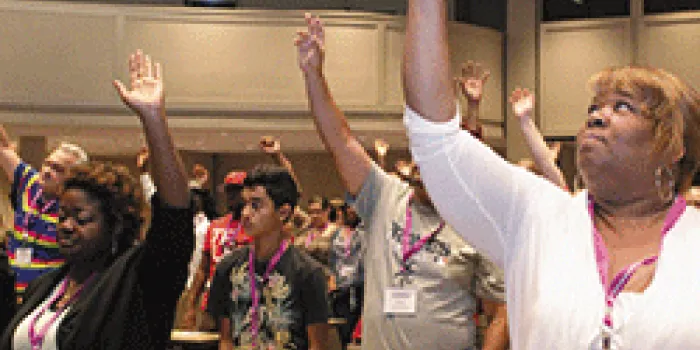For more than 10 years, the National Hemophilia Foundation (NHF) has been committed to providing specialized educational opportunities to members of the community with hemophilia with inhibitors. Each year, NHF hosted three Inhibitor Education Summits, two in English and one in Spanish. These brought people affected by inhibitors and their families together for three days of sessions that focus on their unique needs. This year, NHF expanded this program by adding four Regional Inhibitor Conferences with a focus on reaching out to families who had never attended an NHF inhibitor education program.
An inhibitor is caused when a person’s antibodies react to clotting factor. The immune system sends antigens to break down the protein, which it sees as a foreign invader. As a result, the clotting factor no longer works properly. Between 10% and 30% of people with hemophilia A and 1%–4% of people with hemophilia B develop inhibitors.
The 2015 National Inhibitor Education Summits were held in Denver on July 9–12 and in Atlanta on July 16–19. They were supported by founding sponsor Novo Nordisk and by Baxalta. The Spanish Inhibitor Summit was held in Houston on June 12–14 and was supported by Novo Nordisk. The Regional Inhibitor Conferences, supported by Novo Nordisk and Baxalta, were held in Greenville, South Carolina, on October 9–11; Minneapolis, October 16–18; San Diego, November 6–8; and San Antonio, Texas, on November 20–22.
New Regional Inhibitor Conferences
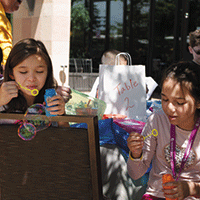
Kids at the Denver Summit Youth Camp
bubble up with enthusiasm.
The New Regional Inhibitor Conferences fit what program designers saw as a gap in the inhibitor education that families were receiving through the national summits. “When a child develops an inhibitor, the world suddenly can become a very scary place,” says Christa Dardaganian, director of Strategic Innovation at NHF. She oversees the program. “For families who have never attended an educational program about inhibitors, we wanted to provide a more intimate meeting where they knew that they could ask questions and share their fears without judgment.”
Each Regional Inhibitor Conference kicked off with a plenary session that showcased a mock comprehensive care visit where a mother heard the news that her toddler son had developed an inhibitor. Using a large doll as a stand-in for the child, nurses, a social worker, a physical therapist (PT) and a doctor each met with the mother to answer questions and provide assistance. “Parents can hear ‘inhibitor’ and freeze,” says Dardaganian about the interactive session. “We wanted to show how the hemophilia treatment center (HTC) team can help when a child develops an inhibitor–in everything from getting tips from a PT on how to keep your child occupied when he has a bleed to working with a social worker on negotiating time off with your employer. In addition, we wanted to show how important it is to know how to communicate effectively with that HTC team.”
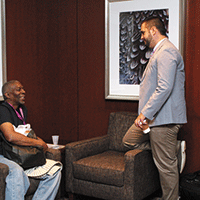
An Atlanta Summit attendee chats
with speaker Jonathan Roberts, MD.
Sessions included pain management in children and how carriers need to be aware of their own potential health issues while caring for a child with an inhibitor. Attendees learned how to teach a child awareness of his inhibitor and took an in-depth look at new therapies in development for treatment. With smaller overall attendance–about 25 families per conference–these sessions allowed for plenty of interaction with the speakers. Rap sessions that ended the conference allowed mothers, fathers, caregivers and teens a chance to talk intimately with other people who shared their experiences.
In 2016, NHF plans to continue with both the national summits, which will be held in August 2016, and the regional conferences, which will take place in the fall. The national summits will continue to be open to anyone who has an inhibitor—active or tolerized—and their families. The regional conferences will be open only to people with an active inhibitor and their families. All inhibitor conferences are fully funded for all participants. Information about registering for these meetings will be available on the NHF website later this year.
Also planned for 2016 is a one-day Active Inhibitor Patient Workshop at NHF’s 68th Annual Meeting in Orlando, Florida. “People who live with inhibitors and their families can feel isolated even from the bleeding disorders community,” said Dardaganian. “We want to give them as many opportunities as we can to feel that they are not alone.”
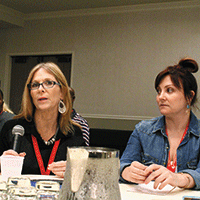 |
Lynette Seaton and her daughter, Elizabeth, share their experiences during the San Diego Regional Inhibitor Conference. |
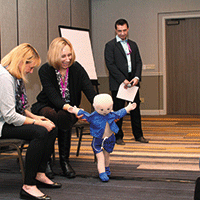 |
Susan Knight, PT, PCS (right) shows Sue Geraghty, RN, MBA, how well “Luke” is walking during a session at the San Diego Conference. |
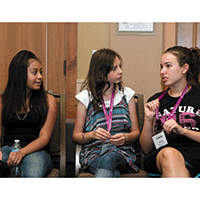 |
The Teen Track at the National Summits provides chances to bond with peers. |
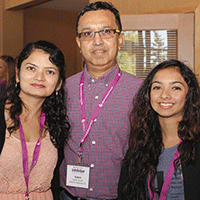 |
Sheela, Subash and Pryanka Chander take a smile break at the Denver Inhibitor Summit. |

